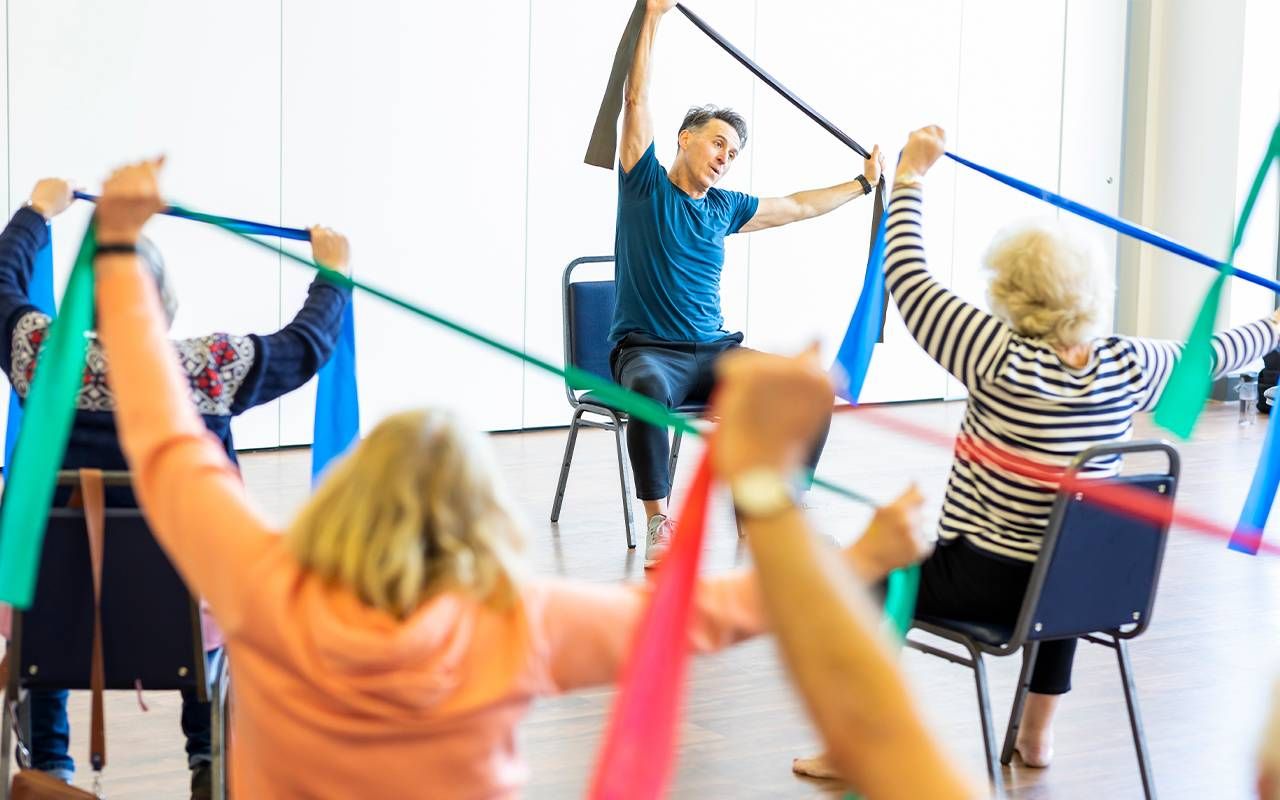How the UK Is Supporting Dementia with Social Prescriptions
It's an approach that aims to improve individuals' health by connecting them with community-based groups and activities
In the northwestern English city of Manchester, someone with dementia might regularly meet a group to play soccer. They might attend seated exercise classes set to reggae or sing with a choir.
The United Kingdom is embracing the practice of social prescribing, an approach that aims to improve individuals' health by connecting them with community-based groups and activities. Some involve nature; others focus on art, sports or music.

Beyond engaging people in activities and interests, programs provide social interaction and connection. As the practice is on the rise for a wide range of health needs, opportunities are growing for using social prescribing to support people with dementia and cognitive impairment.
Experts in brain health and dementia care say social prescribing can help not only by providing programs targeted specifically at people impacted by dementia but by making broader-focused groups more open to people living with cognitive impairment.
Challenging Fear and Creating Positive Moments
The number of people living with dementia — an umbrella of neurological conditions, including Alzheimer's disease, that impact memory and cognitive impairment — is growing worldwide. In the UK, more than 900,000 people are living with dementia and the total is expected to rise in the coming years.
"Integrating people living with dementia into the wider community can make a huge difference to our own perceptions of the disorder."
Mental health can be a challenge; dementia is associated with higher rates of depression. People with dementia are also at risk of social isolation.
Social prescribing programs can both support people living with dementia and can be an opportunity to raise awareness, advocates say.
"Integrating people living with dementia into the wider community can make a huge difference to our own perceptions of the disorder and what life is like with dementia," says Dr. Sarah Fox, a neuroscientist and Global Brain Health Institute Atlantic Fellow for Equity in Brain Health. "I think we still suffer a little bit from a lot of fear."
Understandings of dementia are often quite negative, but Fox says through her research and work, she's seen how active and positive many people are. Opportunities to engage in social settings and activities can make the challenges of dementia easier to weather.
"I think these smaller positives in people's lives and helping people to kind of create those moments, connection with others, helps you get through the harder times," she says.
In Manchester, at least one general practitioner's office has started putting together well-being plans that look beyond the standard medical plans after a dementia diagnosis; the office might refer people directly to activities that suit their needs and interests. Other people with dementia might begin social prescribing activities by seeking them out themselves.
Dementia-Inclusive Initiatives
So far, social prescribing's focus on cognitive impairment is somewhat limited. For example, many people are referred to a dementia coffee group, which might not suit their needs and interests.
"Someone living with dementia, definitely in the earlier stages, but throughout, may not necessarily be wanting to go to a dementia-specific group," says Fox. "It may be something that they're fearful of or that they just don't really want to do."
Dementia United has been working with social prescribers in the Manchester area and has offered guidance for organizations to make groups more accessible for people living with cognitive impairment.
Dementia United project manager Helen Pratt heard from a coordinator of a group in Greater Manchester that plays walking soccer. The team had included older adults, none of whom had dementia, but decided to open up to new members living with cognitive impairment.
"I think these smaller positives in people's lives and helping people to kind of create those moments, connection with others, helps you get through the harder times."
There were some challenges, she says. In each session, one team member is named player of the week and given a trophy they're expected to bring back next time. But when a player living with dementia was selected, the trophy didn't come back.
While there were hurdles at first, Pratt says, that has changed. Now there is a waiting list to join, including people who are and aren't affected by dementia, and she's heard the players have bonded.
"This group are now so supportive of each other," Pratt says. "They're going to the pub together."
Having experts in dementia come along to have conversations and raise awareness can help make social groups like this more accessible for people with cognitive impairment, she says.
New Menu of Community Initiatives
Many programs that support people living with dementia in the greater Manchester area are relatively small, volunteer-led initiatives. However, advocates see an opportunity for more diverse activities in the social prescribing format — though stability is needed.
They weren't a good fit when Kate Darby's father attended dementia-focused events in Stockport, southeast Manchester. Diagnosed in his 60s, he was among the younger attendees, and the music and activities like bingo didn't appeal to him.
Darby and her brother decided to try something different. So on a Saturday evening in July 2019, from 5 to 7 p.m., they held a disco in a space donated by a local club.
"We always wanted to create something that wasn't like a dementia thing. You know, it was just a night out," Darby says. "It just was going to be a place to relax and socialize."
"It's a lot about staying social, staying connected, staying active."
The playlist included some of her dad's favorites, like Bruce Springsteen and Bryan Adams. There was a donated supper, and people could have a drink — a glass of red wine was her father's favorite. People came along with their children and grandchildren.
After the pandemic paused in-person events, the discos are back on. Darby, who runs the program as a volunteer, has been trying to establish a second location.
The initiative is not currently a part of social prescribing networks, but Darby says she'd like to expand Dementia Discos so they can be connected to get referrals.
Staying Connected, Staying Active
Pratt says that feedback from projects Dementia United has supported indicates that the group activities and relationships forged through social programs have a positive impact — from a "Sound of Music" production that involved people with dementia and carers to initiatives like reggae seated exercises that serve the African Caribbean community in Manchester.
"It's those connections and that feeling that there's that peer support," Pratt says. "They've had fun and they've enjoyed themselves and it's just made such a difference to people."
Fox says social prescribing activities can be significant for brain health. In her current research, she's looking at how referring people to services can impact people diagnosed with mild cognitive impairment — when brain function is impaired for their age but not as advanced as dementia.
Research shows that involvement in community groups and services like green social prescribing at that stage can be very impactful, Fox says.
"It's a lot about staying social, staying connected, staying active," she says. "I think being outdoors is a wonderful way of facilitating that no matter what it is you're doing."


